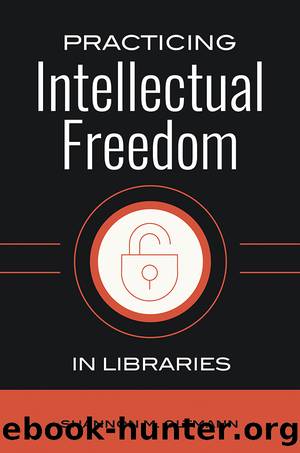Practicing Intellectual Freedom in Libraries by Shannon M. Oltmann

Author:Shannon M. Oltmann
Language: eng
Format: epub
Publisher: ABC-CLIO
Published: 2019-07-12T00:00:00+00:00
Some of these components will be more or less important to different libraries or different types of collections. For example, an academic library looking to expand its collection of audiobooks will certainly want to weigh the types of equipment needed to use various books. A childrenâs librarian will likely put more emphasis on illustrations and binding durability than, say, an adult collection development librarian. Whichever factors are most important and relevant for your particular library should be clearly articulated in the collection development policy.
It is important for the collection development policy to include statements about the significance of intellectual freedom. This establishes that intellectual freedom is a key consideration when building and evaluating the collection. If items are challenged, the library staff can use the collection development policy as evidence that intellectual freedom is important to the library.
The collection development policy can also include reference to the reconsideration policy, establishing a relationship between the two. Essentially, when an item is challenged (asked to be reconsidered), library staff should turn to the collection development policy to see if the item meets the collection objectives contained there (see Chapter 6 for more about reconsideration).
Finally, inclusion of key documents from the ALA serves a similar purpose: this establishes the importance of the relationship between the local library and the ALA, as well as the structure for evaluating reconsideration challenges in light of documents such as the Freedom to Read Statement and Library Bill of Rights. These documents serve as reminders of the purpose of the library and the purpose of its collection (of any type of items). These are important to keep in mind when one is forming and evaluating the collection.
In other words, the collection cannot be based on the whims or preferences of a single individual (or a small group of librarians) but must be designed for the entire community that is being served. The Freedom to Read Statement and the Library Bill of Rights will help keep these priorities foremost.
Any collection development policy should be reviewed by an attorney and by the board of trustees. The attorney should ensure that the policy does not contain anything illegal; this is often a formality with collection development policies, but it is a good practice to develop.
The board of trustees should be quite familiar with library policies, as the trustees serve as a bridge between the community and the library. If the board is familiar with the policies, they can represent and explain the policies to community members who have questions or concerns. In addition, a collection development policy that includes pro-intellectual freedom statements and documents from the ALA will help remind the board about the importance and centrality of intellectual freedom.
Download
This site does not store any files on its server. We only index and link to content provided by other sites. Please contact the content providers to delete copyright contents if any and email us, we'll remove relevant links or contents immediately.
Cecilia; Or, Memoirs of an Heiress — Volume 1 by Fanny Burney(32538)
Cecilia; Or, Memoirs of an Heiress — Volume 2 by Fanny Burney(31936)
Cecilia; Or, Memoirs of an Heiress — Volume 3 by Fanny Burney(31926)
The Great Music City by Andrea Baker(31913)
We're Going to Need More Wine by Gabrielle Union(19032)
All the Missing Girls by Megan Miranda(15929)
Pimp by Iceberg Slim(14479)
Bombshells: Glamour Girls of a Lifetime by Sullivan Steve(14046)
For the Love of Europe by Rick Steves(13875)
Talking to Strangers by Malcolm Gladwell(13342)
Norse Mythology by Gaiman Neil(13335)
Fifty Shades Freed by E L James(13229)
Mindhunter: Inside the FBI's Elite Serial Crime Unit by John E. Douglas & Mark Olshaker(9313)
Crazy Rich Asians by Kevin Kwan(9272)
The Lost Art of Listening by Michael P. Nichols(7487)
Enlightenment Now: The Case for Reason, Science, Humanism, and Progress by Steven Pinker(7304)
The Four Agreements by Don Miguel Ruiz(6743)
Bad Blood by John Carreyrou(6610)
Weapons of Math Destruction by Cathy O'Neil(6261)
